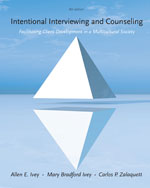Jul 23, 2014 | TPC Outstanding Scholar
Jeffrey M. Warren and Edwin R. Gerler, Jr.

Jeffrey M. Warren and Edwin R. Gerler Jr. received the 2013 Outstanding Scholar Award for Quantitative or Qualitative Research for their article “Effects of School Counselors’ Cognitive Behavioral Consultation on Irrational and Efficacy Beliefs of Elementary School Teachers.” Dr. Warren is an assistant professor of counselor education at the University of North Carolina at Pembroke. He cochairs the Research Quality Task Force for the Transforming School Counseling and College Access Interest Network (TSCCAIN) of the Association for Counselor Education. He is a National Certified Counselor (NCC) and a National Certified School Counselor (NCSC). Dr. Gerler is a professor of counselor education at North Carolina State University. He has served as editor-in-chief of two national counseling journals and was the founding editor of the Journal of School Violence and the founding coeditor of the online publication Meridian, a school computer technologies journal.
Jul 23, 2014 | TPC Outstanding Scholar
Jeffrey M. Warren and Edwin R. Gerler, Jr.


Jeffrey M. Warren and Edwin R. Gerler Jr. received the 2013 Outstanding Scholar Award for Quantitative or Qualitative Research for their article “Effects of School Counselors’ Cognitive Behavioral Consultation on Irrational and Efficacy Beliefs of Elementary School Teachers.” Dr. Warren is an assistant professor of counselor education at the University of North Carolina at Pembroke. He cochairs the Research Quality Task Force for the Transforming School Counseling and College Access Interest Network (TSCCAIN) of the Association for Counselor Education. He is a National Certified Counselor (NCC) and a National Certified School Counselor (NCSC). Dr. Gerler is a professor of counselor education at North Carolina State University. He has served as editor-in-chief of two national counseling journals and was the founding editor of the Journal of School Violence and the founding coeditor of the online publication Meridian, a school computer technologies journal.
Read more about the TPC scholarship awards here.
Jul 23, 2014 | TPC Outstanding Scholar
Kathleen Brown-Rice
 Kathleen Brown-Rice received the 2013 Outstanding Scholar Award for Concept/Theory for her article “Examining the Theory of Historical Trauma Among Native Americans.” Dr. Rice is an assistant professor at the University of South Dakota and a National Certified Counselor (NCC). Her research interests include professional counselor supervision and training with an emphasis on ethical considerations and cross-cultural supervision, Native American mental health and the implications of historical trauma, and the impact of substance use on individuals, families and the community.
Kathleen Brown-Rice received the 2013 Outstanding Scholar Award for Concept/Theory for her article “Examining the Theory of Historical Trauma Among Native Americans.” Dr. Rice is an assistant professor at the University of South Dakota and a National Certified Counselor (NCC). Her research interests include professional counselor supervision and training with an emphasis on ethical considerations and cross-cultural supervision, Native American mental health and the implications of historical trauma, and the impact of substance use on individuals, families and the community.
Read more about the TPC scholarship awards here.
Jul 23, 2014 | TPC Outstanding Scholar

TPC announced the first annual Dissertation Excellence Award and began receiving entries from across the United States. After great deliberation, Joel A. Lane received the 2014 Dissertation Excellence Award for his dissertation, titled The Impact of Attachment Working Models and Social Support on the Subjective and Psychological Well-Being of Emerging Adults in Transition: Testing a Theoretical Mediation Model. Dr. Lane completed his doctoral studies at Oakland University in Detroit, Michigan, under the supervision of Robert S. Fink. According to Dr. Fink, “Dr. Lane’s dissertation demonstrates excellence at the conceptual, empirical and practical application levels.” Currently, Dr. Lane is an assistant professor in the Department of Counselor Education at Portland State University in Portland, Oregon. TPC is pleased with the success of the first Dissertation Excellence Award and looks forward to recognizing outstanding dissertations for many years to come.
Read more about the TPC scholarship awards here.
Jul 11, 2014 | Book Reviews
 Intentional Interviewing and Counseling: Facilitating Client Development in a Multicultural Society, now in its eighth edition, is a textbook designed to teach students the basic skills of counseling and psychotherapy. The authors have updated this most recent edition to include innovative material on empathy, self-actualization, intentionality, resilience, crisis-counseling, self-disclosure, neuroscience, stress management and therapeutic lifestyle changes. Ivey, Ivey and Zalaquett (2014) authored Intentional Interviewing and Counseling with the goal of preparing students “for culturally intentional and flexible counseling and psychotherapy” (p. xvi). They do this by presenting students with a microskills hierarchy that delineates the successive steps in interviewing and counseling. According to the authors, if a student counselor masters the microskills, he or she is able to “anticipate and predict how clients will respond to your [their] interventions” and “be able to shift to skills and strategies that match their needs” (p. 10). Thus, most chapters in Intentional Interviewing and Counseling emphasize the development and adaptation of specific counseling skills that have been shown to help clients develop.
Intentional Interviewing and Counseling: Facilitating Client Development in a Multicultural Society, now in its eighth edition, is a textbook designed to teach students the basic skills of counseling and psychotherapy. The authors have updated this most recent edition to include innovative material on empathy, self-actualization, intentionality, resilience, crisis-counseling, self-disclosure, neuroscience, stress management and therapeutic lifestyle changes. Ivey, Ivey and Zalaquett (2014) authored Intentional Interviewing and Counseling with the goal of preparing students “for culturally intentional and flexible counseling and psychotherapy” (p. xvi). They do this by presenting students with a microskills hierarchy that delineates the successive steps in interviewing and counseling. According to the authors, if a student counselor masters the microskills, he or she is able to “anticipate and predict how clients will respond to your [their] interventions” and “be able to shift to skills and strategies that match their needs” (p. 10). Thus, most chapters in Intentional Interviewing and Counseling emphasize the development and adaptation of specific counseling skills that have been shown to help clients develop.
The textbook contains 16 chapters and about 460 pages, including the 3 appendices but excluding the references and indices. The book is divided into the following five sections: (a) the foundations of counseling and psychotherapy, which describes the microskills approach, ethics, multicultural competence, wellness, attending behavior and observation skills; (b) the basic listening sequence (e.g., questioning, reflecting feeling, active listening); (c) empathic confrontation; (d) interpersonal influencing skills (e.g., self-disclosure, reflecting meaning, and stress management); and (e) skill integration (e.g., treatment planning, relapse prevention). I found the text to be easy to read, and oftentimes chapters include transcripts or diagrams that facilitate a deeper understanding of the material.
The use of transcripts and example counseling sessions is a definite strength of the text. Students are able to read through sessions and reflect on the process comments provided by the author. For example, the appendix includes a transcript of a cognitive behavioral session that helps students to recognize how the microskills integrate with this theoretical orientation. The inclusion of neuroscience is also an interesting feature of the book. The authors often connect core counseling skills such as empathy with neuroscientific research in order to help readers recognize the biological basis of the skills. Lastly, throughout the text the authors note the role of culture and cultural competence in counseling, which could help instructors more easily integrate multiculturalism into their classroom discussions. One element the book seems to lack is a comprehensive emphasis on the role of the therapeutic relationship and working alliance. The relationship is arguably the cornerstone of any counseling approach and has numerous complex and important aspects. It would have been helpful to see this receive more emphasis in the text.
Overall, Intentional Interviewing and Counseling: Facilitating Client Development in a Multicultural Society provides a thorough overview of the basic counseling skills found in the microskills approach. The text is easy to read and has many beneficial features such as discussions of neuroscience, a multicultural perspective, and transcripts of example counseling sessions. Moreover, the instructor’s edition reportedly comes with several ancillary materials including a resource guide and an online test bank. Thus, this text could be a useful resource for anyone teaching a counseling skills course.
Reviewed by: Daniel Gutierrez, NCC, University of North Carolina at Charlotte, Charlotte, NC.
Ivey, A. E., Ivey, M. B., & Zalaquett, C. P. (2014). Intentional interviewing and counseling: Facilitating client development in a multicultural society (8th ed.). Belmont, CA: Cengage Learning.
The Professional Counselor
http://tpcjournal.nbcc.org



 Kathleen Brown-Rice received the 2013 Outstanding Scholar Award for Concept/Theory for her article
Kathleen Brown-Rice received the 2013 Outstanding Scholar Award for Concept/Theory for her article 
 Intentional Interviewing and Counseling: Facilitating Client Development in a Multicultural Society, now in its eighth edition, is a textbook designed to teach students the basic skills of counseling and psychotherapy. The authors have updated this most recent edition to include innovative material on empathy, self-actualization, intentionality, resilience, crisis-counseling, self-disclosure, neuroscience, stress management and therapeutic lifestyle changes. Ivey, Ivey and Zalaquett (2014) authored Intentional Interviewing and Counseling with the goal of preparing students “for culturally intentional and flexible counseling and psychotherapy” (p. xvi). They do this by presenting students with a microskills hierarchy that delineates the successive steps in interviewing and counseling. According to the authors, if a student counselor masters the microskills, he or she is able to “anticipate and predict how clients will respond to your [their] interventions” and “be able to shift to skills and strategies that match their needs” (p. 10). Thus, most chapters in Intentional Interviewing and Counseling emphasize the development and adaptation of specific counseling skills that have been shown to help clients develop.
Intentional Interviewing and Counseling: Facilitating Client Development in a Multicultural Society, now in its eighth edition, is a textbook designed to teach students the basic skills of counseling and psychotherapy. The authors have updated this most recent edition to include innovative material on empathy, self-actualization, intentionality, resilience, crisis-counseling, self-disclosure, neuroscience, stress management and therapeutic lifestyle changes. Ivey, Ivey and Zalaquett (2014) authored Intentional Interviewing and Counseling with the goal of preparing students “for culturally intentional and flexible counseling and psychotherapy” (p. xvi). They do this by presenting students with a microskills hierarchy that delineates the successive steps in interviewing and counseling. According to the authors, if a student counselor masters the microskills, he or she is able to “anticipate and predict how clients will respond to your [their] interventions” and “be able to shift to skills and strategies that match their needs” (p. 10). Thus, most chapters in Intentional Interviewing and Counseling emphasize the development and adaptation of specific counseling skills that have been shown to help clients develop.